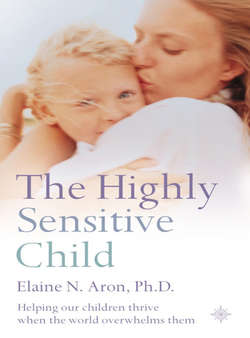Читать книгу The Highly Sensitive Child: Helping our children thrive when the world overwhelms them - Elaine N. Aron, Elaine N. Aron Ph.D. - Страница 30
What to Do If You Are Not Sure
ОглавлениеIf in doubt, have a team of professionals evaluate your child. Start by getting the name of a highly respected professional who takes a team approach, then get the names of the other professionals with whom he or she works. This may be costly, but problems caught early can usually be changed and with far less expense. You need a team because a pediatrician alone may emphasize physical symptoms or solutions. A psychiatrist will be looking for mental disorders that might be helped with medication. A psychologist will want to teach new behaviors but may miss a physical problem. Occupational therapists will emphasize sensorimotor problems and solutions; speech therapists will attend to verbal skills; a social worker will examine the family, school, and community environment. Together, they are great. Indeed, there may be some problem in each area that needs attention. (In my opinion, medication alone is never a sufficient treatment for a behavioral problem in a child, who should be learning how to cope with whatever problem she has.)
A thorough evaluation will take weeks, not hours. Those involved should want reports from you, your child’s teachers or child-care providers, and any professionals who have already seen your child. They should ask for your family’s medical records and history, and someone should observe your child and possibly you and your child together. Above all, they should talk about temperament as part of the total picture and sound knowledgeable on the subject. Unfortunately, many professionals are not, and they can make serious mistakes with an HSC. (See Resources at the end of the book for names of temperament counselors.)
Finally, during and after this evaluation, these professionals should be giving you support and encouragement. You need to be able to trust and respect these people; they are going to have a tremendous effect on your child’s life. If you have doubts about an opinion, get a second one. Those who provide the first opinion should encourage that. Do not be rushed into any treatment unless there is a good reason for speed.
Remember, HSCs are normal kids who most of the time are relaxed and outgoing with those they know well. They listen and express themselves easily. When under stress, they are temporarily out of commission, perhaps very upset. But you will also have seen them feeling good, friendly, curious, and proud of themselves.
Should you look for a “cure” for your child’s sensitivity? No. Temperament traits can be worked with so that the child learns how to cope and fit into a given culture, and parents can learn how to help with that. Trying to cure, remove, or hide a trait, however, is likely to lead to more trouble. Sensitive older boys and men in our society often feel they have to hide their sensitivity, and they do so usually at great personal cost. Variety in temperament is the “spice of life”—and perhaps the best hope of a species’ survival.
